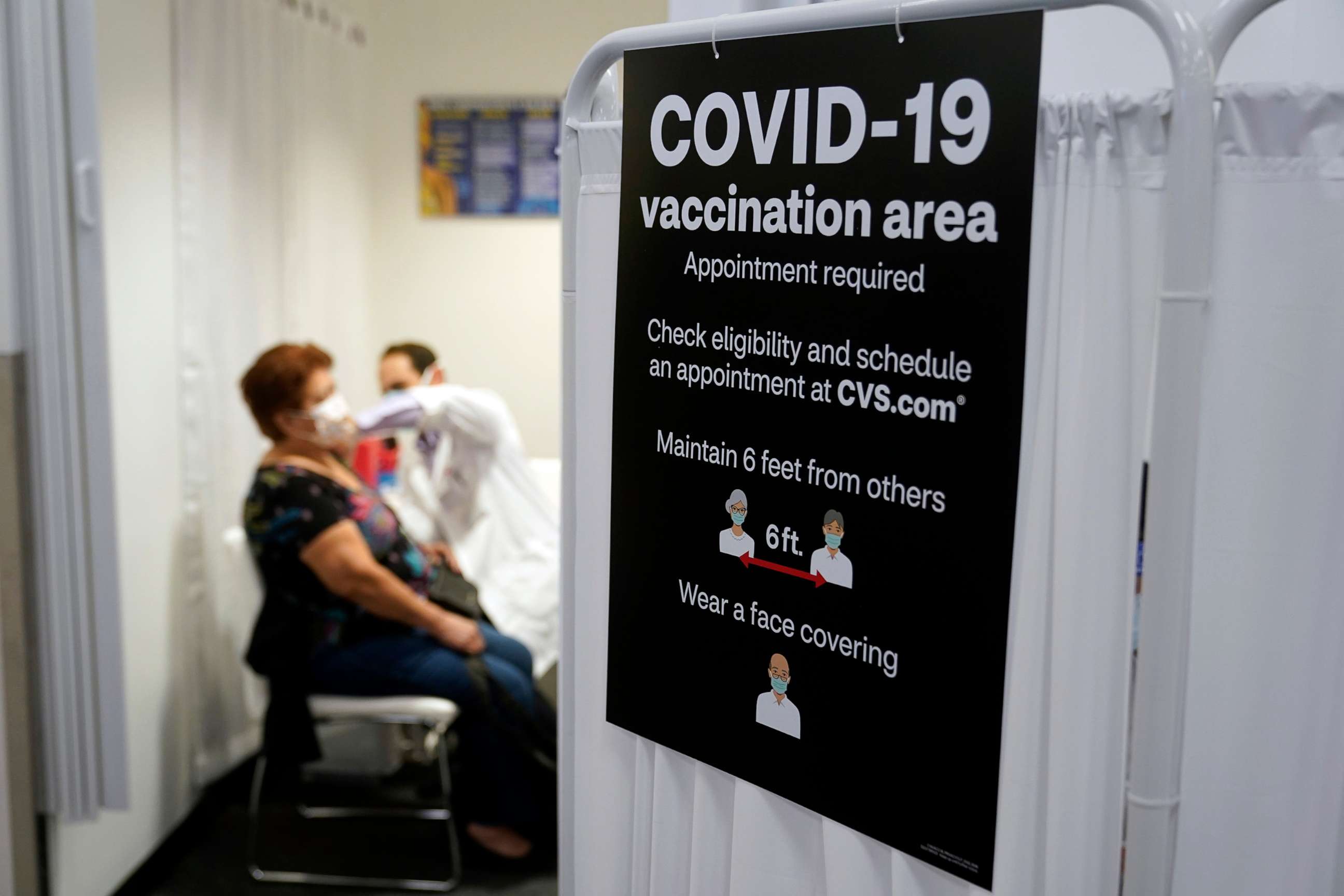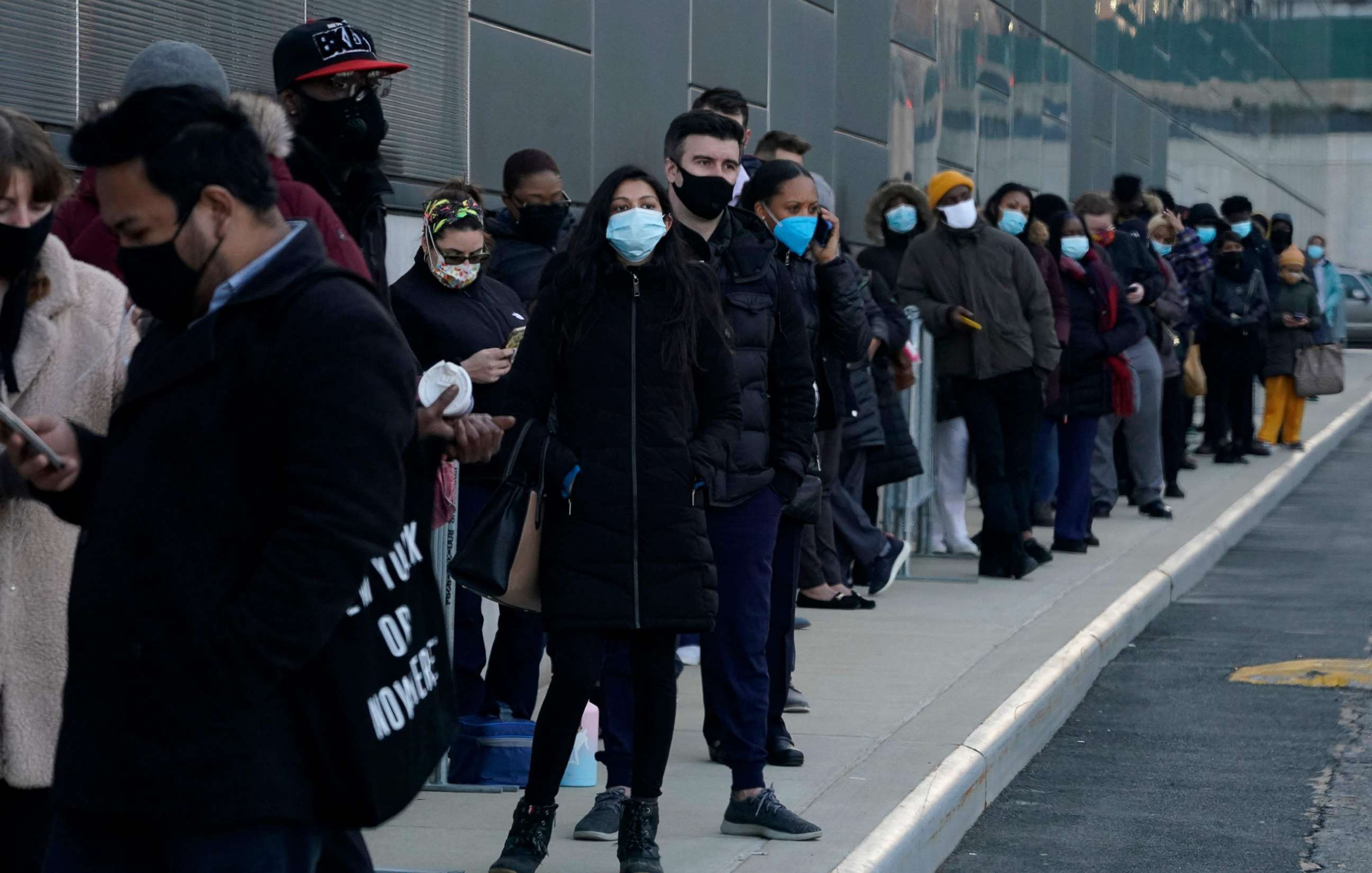Fully vaccinated individuals can socialize without masks, distancing in some cases, CDC says
The new guidance says those fully vaccinated should still wear masks in public.
Americans who have received the full COVID-19 vaccine can gather with vaccinated grandparents or friends indoors without wearing masks or keeping their distance, according to new CDC guidance announced Monday, and those grandparents can visit with and hug family members that aren't vaccinated as long as they don't have underlying medical conditions that put them at high risk for COVID-19.
But getting the vaccine does not mean you should travel or gather in large groups, according to the CDC, which says vaccinated individuals should still stick to the guidance.
The CDC says individuals who are fully vaccinated -- meaning two weeks after they have received the second dose of the Pfizer or Moderna vaccines or the single dose Johnson & Johnson vaccine -- can safely gather around friends or family who are also vaccinated indoors without masks or social distancing, as well as visit with friends or family from a single household who aren't vaccinated but have a low risk of severe disease from COVID-19.
"If you and a friend or you and a family member are both vaccinated, you can have dinner together," CDC Director Dr. Rochelle Walensky said, without wearing masks and without distancing. "You can visit your grandparents, if you have been vaccinated and they have been too," she said in a White House briefing.
In a group where some individuals are vaccinated and some aren't, Walensky said the recommendations are more complicated. CDC says it is low risk for vaccinated individuals to gather with unvaccinated individuals indoors without masks and social distancing, as long as the people who aren't vaccinated are at low risk of severe disease and no one in their household is at high risk.
"Here's an example: If grandparents have been vaccinated, they can visit their daughter and her family, even if they have not been vaccinated, so long as the daughter and her family are not at risk for severe disease," she said.
The new guidance also says that vaccinated individuals don't need to quarantine or get tested if they come in contact with someone positive for COVID-19 and don't have any symptoms.
But in public, even people who have received the COVID-19 vaccine should continue to wear masks and maintain distance when in public, visiting with people at severe risk for COVID-19 disease who have not been vaccinated, or when socializing with groups of unvaccinated people from multiple households, even if they are at low risk of disease.

The CDC says people who have been vaccinated should still avoid gathering in larger groups and should get tested if they show any symptoms of COVID-19.
"We know that people want to get vaccinated so they can get back to doing the things they enjoy with the people they love," Walensky, said in an earlier news release.
"There are some activities that fully vaccinated people can begin to resume now in the privacy of their own homes. Everyone – even those who are vaccinated – should continue with all mitigation strategies when in public settings. As the science evolves and more people get vaccinated, we will continue to provide more guidance to help fully vaccinated people safely resume more activities," she said.
When asked why CDC is still recommending people avoid travel Walensky said the data shows a connection between increased travel and a surge in new COVID cases.
"In terms of travel, here's what we know: every time that there's a surge in travel, we have a surge in cases in this country. We know that many of our variants have emerged from international places, and we know that the travel corridor is a place where people are mixing a lot," she said.
"We are really trying to restrain travel at this current period of time, and we're hopeful that our next set of guidance will have more science around what vaccinated people can do, perhaps travel being among them."
Federal officials working on the pandemic response have said they want to provide optimism to people frustrated with what's now been a year of restrictions, staying at home, and not being able to see friends or family.

But, at the same time, the number of COVID-19 cases is high and they want people to remain cautious until fewer new COVID-19 cases are reported and more Americans are vaccinated.
"We believe these new recommendations are an important first step to our -- in our efforts to resume everyday activities in our communities. However, we remain in the midst of a serious pandemic and, still, over 90% of our population is not fully vaccinated, but we are working hard to get there," Walensky said.
"Therefore, everyone whether vaccinated or not, should continue to avoid medium and large size gatherings, as well as non-essential travel, and when in public spaces, should continue to wear a well-fitted mask, physically distance, and follow other public health measures to protect themselves and others."
Vaccinations are ramping up significantly in the U.S. as the supply of the three authorized vaccines increase. 58.8 million Americans have received at least one dose and 12% are considered fully vaccinated, meaning they've received both required doses of the Pfizer or Moderna vaccines.
ABC’s Aaron Katersky reports for ABC News Radio:



